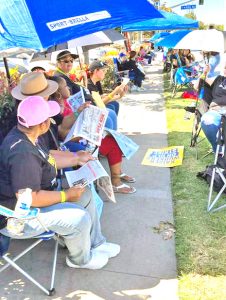Post Toyi-Toyi Zoom Meeting Advances the Struggle here ♦ Talking About Communism with a Co-Worker here ♦ Communism and the common good here ♦Kaiser Strike here ♦ Dearest Red Flag here ♦

Post Toyi-Toyi Zoom Meeting Advances the Struggle
This morning we had a very good Zoom meeting with the people who participated in toyi-toyi. They are enthusiastically thinking about toyi-toyi at the gate of another big factory and leading up to the May Day March.
They are thinking big. Now that they have 50 or 60 members at different levels, they are expanding the struggle with a goal of a thousand people. The struggle is just starting. They repeatedly say they have learned so much from the Party. I said, “We are learning from you. It’s one party and one fight.”
Comrade A responds: “Thank you. Having a zoom meeting with you makes us explore many more things that we need to do, especially with the workers here on our side.
“Tomorrow, we have another meeting to address the report. We will do everything we can to involve the people I met in the streets. We would like to continue having meetings with you so we can be on the same platform.”
Comrade B adds: “Thank you for opening everything to us and always waking us up to everything. Please send me all the dialectics. Most of the time we are sitting together, and we can study dialectics, so that we can learn more, know more, each and every corner of ICWP. I thank all the comrades all over the world.”
—Comrade in South Africa
Talking about Communism with a Co-worker
“These things happen very often in Mexico,” said a co-worker in Los Angeles (USA). “The culprit is the state. Those of us who are indigenous people are nothing to them.”
He was referring to the fact that September 26th was the 9th anniversary of the capture, kidnapping, and disappearance of 43 students from Ayotzinapa, Mexico.
I told him, “It’s not only in Mexico. It is something that capitalism does worldwide to stop the masses from rising up against their system. But that is something they will not be able to avoid. As this continues, the masses are changing their way of seeing the world and are blaming capitalism directly.”
“But that will continue to happen. It will never end. There will always be deaths and disappearances at the hands of governments,” my co-worker answered.
I said, “The only way that all the evils of capitalism will end is by organizing and fighting for communism.”
Laughing and joking, he said, “You’re going to talk about communism again.”
Other co-workers also knew about the 43 disappeared students. But they were not interested in talking about it, except for this friend, with whom I had a good discussion.
I invited him to the next meeting of our collective where we will watch a movie, eat, and talk about our political ideas.
—Young Comrade
In Communism We Will Live for the Common Good
“Each new edition of Red Flag teaches us and opens our minds to the harsh reality that we live as a working class,” commented R.
It always leads us to discussions that drive us to see the necessity of change. The political economy article “Whose Time?” and the cartoon with it together with the caricature made us think about capitalism’s vicious circle of exploitation. The capitalist bosses keep growing and oppressing the most vulnerable.
Capitalist greed dehumanizes workers. The ruling class is a cancer on the working class. Let’s think about how much the life of a worker is worth to a boss? What happens when we are no longer productive for them?
“This made me think about all the time I have worked, giving my life to my bosses. Going without time for my family, without being able to rest and much less for sick leave when I am sick,” added B. “Otherwise, I risk losing my job, the livelihood of my family.
“There are many of us who live the same thing,” B continued. “If we are no longer functional or productive, they throw us away. We are disposable. They always threaten that we are not indispensable.”
We all come to the same conclusion: we must fight for ourselves, for the working class. The boss is the one who needs us most. We are the ones who generate and multiply their income. Thanks to us, they become richer.
We know well that capitalist bosses, to continue enriching themselves, fight among themselves. Therefore they exploit, bankrupt, and kill the essence of each worker’s human life by making them work exhausting hours, poorly paid and without rest.
In a communist society everything will change. Profits will be eliminated. We will not be wage slaves. We will work collectively for what we need. We will live for the common good.
That is why we will continue meeting, reading Red Flag, and fighting for a communist revolution.
—Red Flag readers in El Salvador
Bringing Red Flag to Kaiser Strike

LOS ANGELES (USA), October 6—”We do everything, they do nothing. We keep this thing running,” a young Kaiser Health striker told others on the picket line.
A comrade who was distributing Red Flag said to him, “That’s right, look at this article.”
The worker took the paper, and said, “Right on!” He read the headline aloud: “Kaiser Strike: The capitalists unite to oppress us, and we must unite for revolution!” He told his friends, “This is true, are you listening?” Some who were listening took the Red Flag newspaper and passed it to other workers who were next to them.
Comrades went to three hospitals and passed out over 560 copies of Red Flag on the picket lines. Workers enthusiastically took the paper. Some donated money, and there were very good discussions about communism.
Dearest Red Flag,
I have only one real criticism of “The History of the Earth and the Future of Communism.” (Red Flag, Volume 14, Number 12). It is the use of the term “Anthropocene” to describe the environmental consequences of the white colonial sickness alone.
Humans cannot be said to all have the same relationship with their environments. The article associates bleak imagery with the term. This serves to further cement the idea that the well-being of humans is fundamentally at odds with that of nonhuman life. This erases indigenous ways of life that worked with, rather than against, their environments for thousands of years. That was systematically made impossible by colonizers.
Further, this is alienation from (re: ‘invention of’) Nature in the mind of the white colonizer. It is actually what excuses and inspires the same environmental abuse, neglect, and destruction that this article points to.
This is only one manifestation of the startlingly deep connection between social and ecological health. It serves as one of nine guiding principles for the work of Climate Alliance of the South Sound.
As part of our continuous study practice, we are currently reading “A History of the World in Seven Cheap Things.” This suggests instead calling this epoch the “Capitalocene” to describe the profit-driven maladies of our world today. This recognizes the respectful relationships held with the environment by indigenous peoples past and present.
Thanks for holding space!
—Shapes

